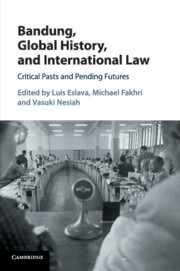Crossref Citations
This Book has been
cited by the following publications. This list is generated based on data provided by Crossref.
Lustig, Doreen
2017.
Governance Histories of International Law.
SSRN Electronic Journal,
Lessa, Pablo Henrique Cordeiro
and
Martini, Sandra Regina
2017.
International terrorism as an instrument of political struggle and of injury to integrational law.
Asian Journal of German and European Studies,
Vol. 2,
Issue. 1,
CLARK, MARTIN
2018.
Ambivalence, anxieties / Adaptations, advances: Conceptual History and International Law.
Leiden Journal of International Law,
Vol. 31,
Issue. 4,
p.
747.
SINCLAIR, GUY FITI
2018.
Towards a Postcolonial Genealogy of International Organizations Law.
Leiden Journal of International Law,
Vol. 31,
Issue. 4,
p.
841.
Abraham, Itty
2018.
Decolonizing arms control: the Asian African Legal Consultative Committee and the legality of nuclear testing, 1960–64.
Asian Journal of Political Science,
Vol. 26,
Issue. 3,
p.
314.
2018.
Books Received.
American Journal of International Law,
Vol. 112,
Issue. 3,
p.
548.
Castro, Douglas
2018.
China Investments in Latin America – A Critical Perspective to the Mainstream Discourse of Imperialism in the Region.
SSRN Electronic Journal,
Iskandar, Pranoto
2018.
Non-Citizen Rights in ASEAN.
Social & Legal Studies,
Vol. 27,
Issue. 2,
p.
180.
Umar, Ahmad Rizky Mardhatillah
2019.
Rethinking the Legacies of Bandung Conference: Global Decolonization and the Making of Modern International Order.
Asian Politics & Policy,
Vol. 11,
Issue. 3,
p.
461.
Cheong, Sharon
2019.
A Subaltern Geopolitics?
From the Tricontinental to the Global South: Race, Radicalism, and Transnational Solidarity
, by Anne G. Mahler, Durham, NC, Duke University Press, 2018, 360 pp., Pbk US $27.95, ISBN: 9780822371250
Bandung, Global History, and International Law: Critical Pasts and Pending Futures
, by Luis Eslava, Fakhri Michael and Vasuki Nesiah, eds., Cambridge, UK, Cambridge University Press, 2017, 733 pp., Hbk US $160.00, ISBN: 9781107123991
.
Geopolitics,
Vol. 24,
Issue. 4,
p.
989.
Eslava, Luis
2019.
El estado desarrollista: independencia, dependencia y la historia del Sur.
Revista Derecho del Estado,
p.
25.
Obregón, Liliana
2019.
Peripheral Histories of International Law.
Annual Review of Law and Social Science,
Vol. 15,
Issue. 1,
p.
437.
Liu, Hong
and
Zhou, Taomo
2019.
Bandung humanism and a new understanding of the Global South: an introduction.
Critical Asian Studies,
Vol. 51,
Issue. 2,
p.
141.
MALLAVARAPU, SIDDHARTH
2020.
‘After fragmentation’: Notes from the global South.
Global Constitutionalism,
Vol. 9,
Issue. 2,
p.
424.
Miyawa, Maxwel
2020.
Towards Development Justice: Re-visiting the Accountability of the World Bank and IMF from a Right to Development Perspective.
SSRN Electronic Journal,
Ferretti, Federico
2020.
Subaltern connections: Brazilian critical geographers, development and African decolonisation.
Third World Quarterly,
Vol. 41,
Issue. 5,
p.
822.
Mantilla, Giovanni
2020.
Social pressure and the making of wartime civilian protection rules.
European Journal of International Relations,
Vol. 26,
Issue. 2,
p.
443.
Saksena, Priyasha
2020.
Jousting Over Jurisdiction: Sovereignty and International Law in Late Nineteenth-Century South Asia.
Law and History Review,
Vol. 38,
Issue. 2,
p.
409.
Mulich, Jeppe
2020.
An imperial imaginary.
Cambridge Review of International Affairs,
Vol. 33,
Issue. 1,
p.
18.
Stolk, Sofia
and
Vos, Renske
2020.
International Law's Collected Stories.
p.
1.



